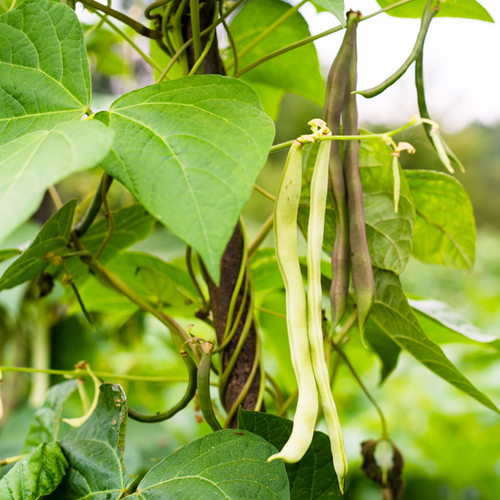
Phaseolus vulgaris
Scientific names: Phaseolus vulgaris, Phaseolus vulgaris varieties
Family: Fabaceae/Leguminosae
Alternate names: Almonga Beans, Baked Beans, Bean Pod, Black Beans, Baked Beans, Borlotti Beans, Cannelli Beans, Common Bean, Cranberry Beans, Curruquiul, Gousse de Haricot, Gousses de Haricot, Green Bean, Haricot à Parchemin, Haricot à Rames, Haricot Beurre, Haricot Blanc, Haricot Commun, Haricot Jaune, Haricot Mange-Tout, Haricot Mange-Tout Jaune, Haricot Mange-Tout Vert, Haricot Noir, Haricot Potager, Haricot Sec, Haricot Vert, Kidney Bean, Legume, Légumineuse, Mange-Tout, Navy Bean, Petit Haricot Noir, Phaseoli Fructus, Phaseolus, Pinto Bean, Refried Beans, Seed-Free Bean Pods, Sine Semine, Snap Bean, Starch Blocker, String Bean, Vaina de Frijol, Wax Bean, White Bean, White Kidney Bean
Actions: Alpha-amylase inhibitory, Antibacterial, Anticancer, Antidiabetic, Antioxidant, Antiparasitic, Antiviral, Bone, Weight loss effect
Background
Phaseolus vulgaris are a group of plants that produces various types of beans, including kidney beans, black beans, pinto beans, navy beans, and many others.
Phaseolus vulgaris beans and bean pods are a source of dietary fiber, protein, and carbohydrates. Fiber might help reduce how much cholesterol the body absorbs. Enzymes in Phaseolus vulgaris beans might also decrease how much starch the body absorbs.
People use Phaseolus vulgaris for obesity. It is also used for diabetes, colon cancer, high cholesterol, kidney stones, and many other conditions, but there is no good scientific evidence to support these uses.
Phaseolus vulgaris beans and bean pods are a source of dietary fiber, protein, and carbohydrates. Fiber might help reduce how much cholesterol the body absorbs. Enzymes in Phaseolus vulgaris beans might also decrease how much starch the body absorbs.
People use Phaseolus vulgaris for obesity. It is also used for diabetes, colon cancer, high cholesterol, kidney stones, and many other conditions, but there is no good scientific evidence to support these uses.
Safety Safety definitions
When taken by mouth: Phaseolus vulgaris bean extracts are possibly safe when used for up to 3 months. But eating large amounts of fresh Phaseolus vulgaris bean husks is possibly unsafe. Raw husks contain chemicals called lectins. These chemicals can cause stomach upset, nausea, vomiting, and diarrhea. Cooking destroys these chemicals.
Special Precautions & Warnings:
Pregnancy and breast-feeding: There isn't enough reliable information to know if Phaseolus vulgaris is safe to use when pregnant or breast-feeding. Stay on the safe side and avoid use.Effectiveness
NatMed Pro rates effectiveness based on scientific evidence according to the following scale: Effective, Likely Effective, Possibly Effective, Possibly Ineffective, Likely Ineffective, Ineffective, and Insufficient Evidence to Rate.
Possibly effective Effectiveness definitions
- Obesity. Taking Phaseolus vulgaris extract by mouth might help reduce body weight and waist size in overweight and obese adults.
Dosing & administration
Phaseolus vulgaris extracts have most often been used by adults in doses of 800-1000 mg by mouth two or three times daily for up to 12 weeks. Speak with a healthcare provider to find out what dose might be best for a specific condition.
Interactions with pharmaceuticals
Medications for diabetes (Antidiabetes drugs)
Interaction Rating=Moderate Be cautious with this combination.
Phaseolus vulgaris might lower blood sugar levels. Taking Phaseolus vulgaris along with diabetes medications might cause blood sugar to drop too low. Monitor your blood sugar closely.
Interactions with herbs & supplements
Herbs and supplements that might lower blood sugar: Phaseolus vulgaris might lower blood sugar. Taking it with other supplements with similar effects might lower blood sugar too much. Examples of supplements with this effect include aloe, bitter melon, cassia cinnamon, chromium, and prickly pear cactus.
Iron: Phaseolus vulgaris contains phytic acid. Phytic acid can reduce the amount of iron that the body absorbs from supplements.
Iron: Phaseolus vulgaris contains phytic acid. Phytic acid can reduce the amount of iron that the body absorbs from supplements.
Interactions with foods
Phaseolus vulgaris contains phytic acid, which can reduce the ability to absorb non-heme iron from foods. Non-heme iron is found in plant-based foods. But it's not clear if this is a big concern.
vital.ly has licensed monographs from TRC Healthcare.
This monograph was last reviewed on 24/03/2025 11:00:00 and last updated on 23/05/2018 21:50:04. Monographs are reviewed and/or updated multiple times per month and at least once per year.
Natural Medicines disclaims any responsibility related to medical consequences of using any medical product. Effort is made to ensure that the information contained in this monograph is accurate at the time it was published. Consumers and medical professionals who consult this monograph are cautioned that any medical or product related decision is the sole responsibility of the consumer and/or the health care professional. A legal License Agreement sets limitations on downloading, storing, or printing content from this Database. No reproduction of this monograph or any content from this Database is permitted without written permission from the publisher. It is unlawful to download, store, or distribute content from this site.




